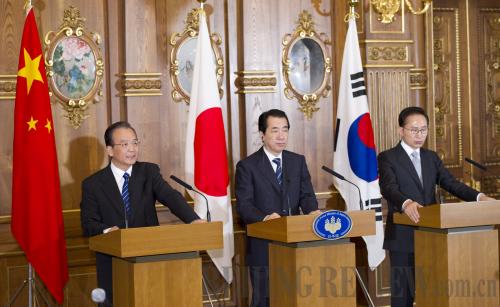|
 |
|
MEETING THE PRESS: Chinese Premier Wen Jiabao, Japanese Prime Minister Naoto Kan and South Korean President Lee Myung Bak attend a press conference after the fourth China-Japan-South Korea trilateral summit in Tokyo on May 22 (HUANG JINGWEN) |
The recent China-Japan-South Korea summit bolstered mutual understanding between the three East Asian nations, but concrete actions are needed to implement agreements reached at the summit, Chinese analysts said.
On May 21-22, a trilateral summit for China, Japan and South Korea was held in Tokyo. Chinese Premier Wen Jiabao, Japanese Prime Minister Naoto Kan and South Korean President Lee Myung Bak attended the meeting. With the aim of reinforcing mutual trust and demonstrating solidarity among neighbors, the leaders discussed post-quake cooperation, disaster management and nuclear safety, among other topics.
"Facing an international financial crisis, massive natural disasters and a complicated regional and international situation, the cooperation between China, Japan and South Korea has experienced tests and achieved incredible development," said Chinese Premier Wen Jiabao at the summit. "The three countries are in the same boat, we row together to counter challenges and the spirit of mutual trust is worth continuing to pursue."
Nuclear safety
"The biggest achievement was the joint declaration issued after the summit," said Shi Yongming, an associate research fellow with the China Institute of International Studies. "The document sends out positive political signals for closer cooperation between the three neighbors."
In the joint declaration, leaders of the three countries vowed to deepen "future-oriented comprehensive cooperative partnerships." The three sides agreed to help each other, especially at times of disaster and adversity. They also agreed to cooperate on disaster management and nuclear power safety.
Nuclear safety was put on the agenda due to the recent nuclear disaster in Japan, and this summit enhanced the three countries' awareness of cooperation in this field, Shi said. Previously, many countries believed backward nuclear technology was a major cause of nuclear accidents, but now the reality turned out poor management could also be a probable reason.
It was possible to establish a regional nuclear safety cooperation mechanism in the Northeast Asian region, but Japan should be more transparent in providing data to its neighboring countries, Shi said.
During the recent nuclear disaster in Fukushima, Japan shared data with the United States based on the Treaty of Mutual Cooperation and Security the two allies signed in 1951. But it has not provided adequate data to China and other neighboring countries, Shi said.
Japan was hit by a devastating 9.0-magnitude earthquake on March 11. The quake and following tsunami caused a serious nuclear disaster at the Fukushima Daiichi Nuclear Power Plant in northeast Japan. Radiation leaks at the plant severely polluted the environment, sparking concerns in neighboring countries.
Japan is committed to sharing with China, South Korea and the rest of the world lessons learned from the Fukushima nuclear crisis, said the joint declaration. While the three nations shared the belief that nuclear energy remains an important option for many countries, they stressed nuclear safety was a prerequisite for developing nuclear energy.
Leaders attending the trilateral summit visited earthquake-ravaged Miyagi and Fukushima prefectures on May 21. It was the first time for foreign leaders to visit Fukushima since the March 11 quake and tsunami.
| 